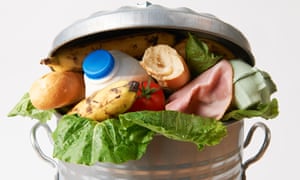Study finds 400m meals' worth of edible food wasted each year
Report by Wrap says 18% of 270,000 tonnes of edible food waste was redistributed to charities for food banks

Fresh Food in a bin
Wrap said its report gives the clearest indication yet of of where food waste occurs. Photograph: Alamy
Rebecca Smithers
Tuesday 17 May 2016 07.27 EDT Last modified on Tuesday 17 May 2016 11.29 EDT
More than 400m meals’ worth of edible food waste in the UK grocery supply chain could be redistributed to feed hungry people each year, according to a government-funded report.
Wrap said its report gives the clearest indication yet of of where food waste occurs. Photograph: Alamy
Rebecca Smithers
Tuesday 17 May 2016 07.27 EDT Last modified on Tuesday 17 May 2016 11.29 EDT
More than 400m meals’ worth of edible food waste in the UK grocery supply chain could be redistributed to feed hungry people each year, according to a government-funded report.
Just 18% of the 270,000 tonnes of potentially edible food waste produced last year was redistributed to businesses or charities for use in food banks, according to analysis by the Waste & Resources Action Programme (Wrap).
The government’s waste advisory body claims its study is the most comprehensive review of surplus food and food waste yet, offering insight into how the 1.1m tonnes of avoidable food waste is being generated through the analysis of 11 manufacturing sub-sectors.
It found five of these sectors – dairy products; meat, poultry and fish; ambient products; fresh fruit and vegetable processing; and bakery, cake and cereals – together trigger about 80% of avoidable food waste in manufacturing.
Wrap has produced a range of resources for food manufacturers and retailers signed up to the voluntary Courtauld 2025 agreement. This involves companies including Tesco, Sainsbury’s and Unilever pledging to reduce the resource intensity of the UK’s food and drink sector by 20% over the next nine years.
“Through a combination of prevention, redistribution to people and diversion to animal feed, the grocery supply chain could, in the next 10 years, almost halve its avoidable food waste from 2009, when we first started work in this area. This will significantly contribute to delivering the Courtauld 2025 food waste prevention target.”
“Through a combination of prevention, redistribution to people and diversion to animal feed, the grocery supply chain could, in the next 10 years, almost halve its avoidable food waste from 2009, when we first started work in this area. This will significantly contribute to delivering the Courtauld 2025 food waste prevention target.”
Surplus food redistribution charity FareShare welcomed the report but said it estimated that as much as 400,000 tonnes of good, surplus food could be redistributed each year.
“Wrap’s report confirms what FareShare has been saying for some time: that hundreds of thousands of tonnes of good, surplus food could be saved from waste each year, and redistributed to charities to feed vulnerable people,” said the FareShare chief executive, Lindsay Boswell.
“FareShare’s experience suggests that Wrap’s figures are actually understated, and that as much as 400,000 tonnes of good, in-date surplus food could be redistributed to feed people each year.”
The online supermarket Ocado has thrown its weight behind the drive to cut food waste, pledging produce from cancelled orders to the Real Junk Food Project – a network of cafes that take delivery of food while it is still useable.
Suzanne Westlake, head of corporate responsibility at Ocado, said: “We believe we are the first UK retailer to send customer-cancelled orders (including fresh food with products with long sell-by dates) straight to charity. Our collaboration with TRJFP ensures we can help anyone and everyone benefit from nutritious and delicious meals.”
No comments:
Post a Comment